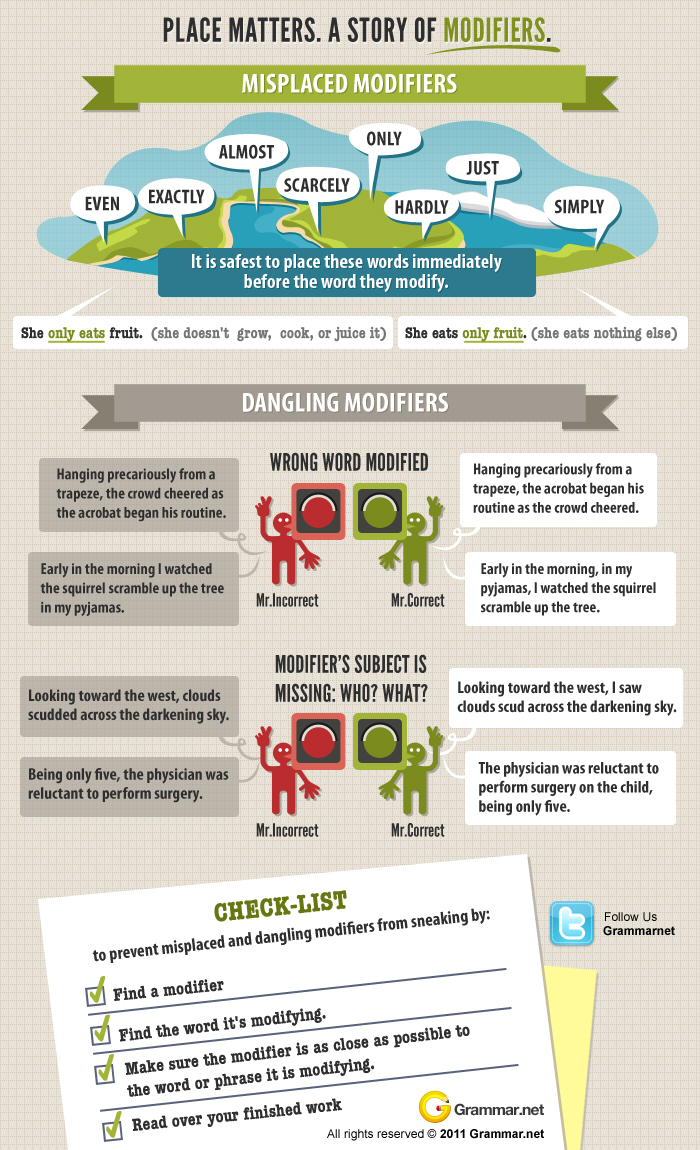Misplace your keys, and you may miss an appointment. Misplace your cell phone, and you will miss some calls. But — misplace or dangle your modifiers, and readers will wonder what in the world you’re trying to say.
Modifiers are words, phrases, and clauses that limit or describe other words or groups of words. They can be adjectives, adverbs, prepositional phrases, or phrases that begin with a participle. When used incorrectly, they’re referred to as misplaced and dangling modifiers. At the least, they frustrate the reader; at best, they’re unintentionally humorous.
Click here to download high resolution version of the poster.
Misplaced modifiers are modifiers that have been placed incorrectly; the meaning of the sentence is muddled.
Misplaced: We have an assortment of exercise equipment for physically active people with programmable features. (What?!)
Corrected: For physically active people, we have an assortment of exercise equipment with programmable features.
Some one-word modifiers, particularly almost, even, hardly, exactly, scarcely, just, simply, and only can subtly change the meaning of a sentence. It’s usually safest to place these words immediately before the word they modify. Let meaning dictate placement.
For example:
She only eats fruit. (she doesn’t grow, cook, or juice it–only modifies the verb, eats)
She eats only fruit. (she eats nothing else–only modifies the object, fruit)
Dangling modifiers are a little different: they appear to modify the wrong word or a word that isn’t in the sentence. They usually contain action words and are often, although not always, placed at a sentence’s beginning. Specific examples of dangling modifiers are shown below.
Wrong word modified:
Hanging precariously from a trapeze, the crowd cheered as the acrobat began his routine.
Is the crowd really hanging from a trapeze? Not likely. To prevent dangling modifiers, the modifying clause should be placed close to the word it is modifying—in this case the acrobat:
Hanging precariously from a trapeze, the acrobat began his routine as the crowd cheered.
Modifier’s subject is missing:
Looking toward the west, clouds scudded across the darkening sky.
Someone must be doing the looking, but that someone is missing. Here’s one way to rewrite this sentence:
Looking toward the west, I saw clouds scud across the darkening sky. (tells who is looking–I)
To prevent misplaced and dangling modifiers from sneaking by, always read over your finished work. Find every modifier. Ask, “What is it modifying?” If you can’t tell, neither can your reader. Change or add words until the meaning is clear. Then consider, “Is the modifier as close as possible to the word or phrase it is modifying?” Remember–the closer the better . . . unless your objective to is to see how many funny examples of dangling modifiers you can create.
For practice, let’s look over a few more examples of dangling modifiers and how to correct them:
Incorrect: Early in the morning I watched the squirrel scramble up the tree in my pyjamas.
Correct: Early in the morning, in my pyjamas, I watched the squirrel scramble up the tree.
Incorrect: Being only five, the physician was reluctant to perform surgery.
Correct: The physician was reluctant to perform surgery on the child, being only five.
Incorrect: After twenty years in the hotel lobby the two friends crossed paths again.
Correct: After twenty years, the two friends crossed paths again in the hotel lobby.
Incorrect: We saw several lions looking out the railroad car’s window.
Correct: Looking out the railroad car’s window, we saw several lions.
Now it’s your turn to come up with funny examples of dangling modifiers. Take a look at the texts and emails you receive this week; read those work memos carefully. When you catch an especially humorous example, write it down. Who knows? You may find enough examples to fill a book.





![10 Tips to Improve Your Grammar [infographic]](https://www.grammar.net/wp-content/uploads/2011/04/infographics_10tips-308x95.jpg)



